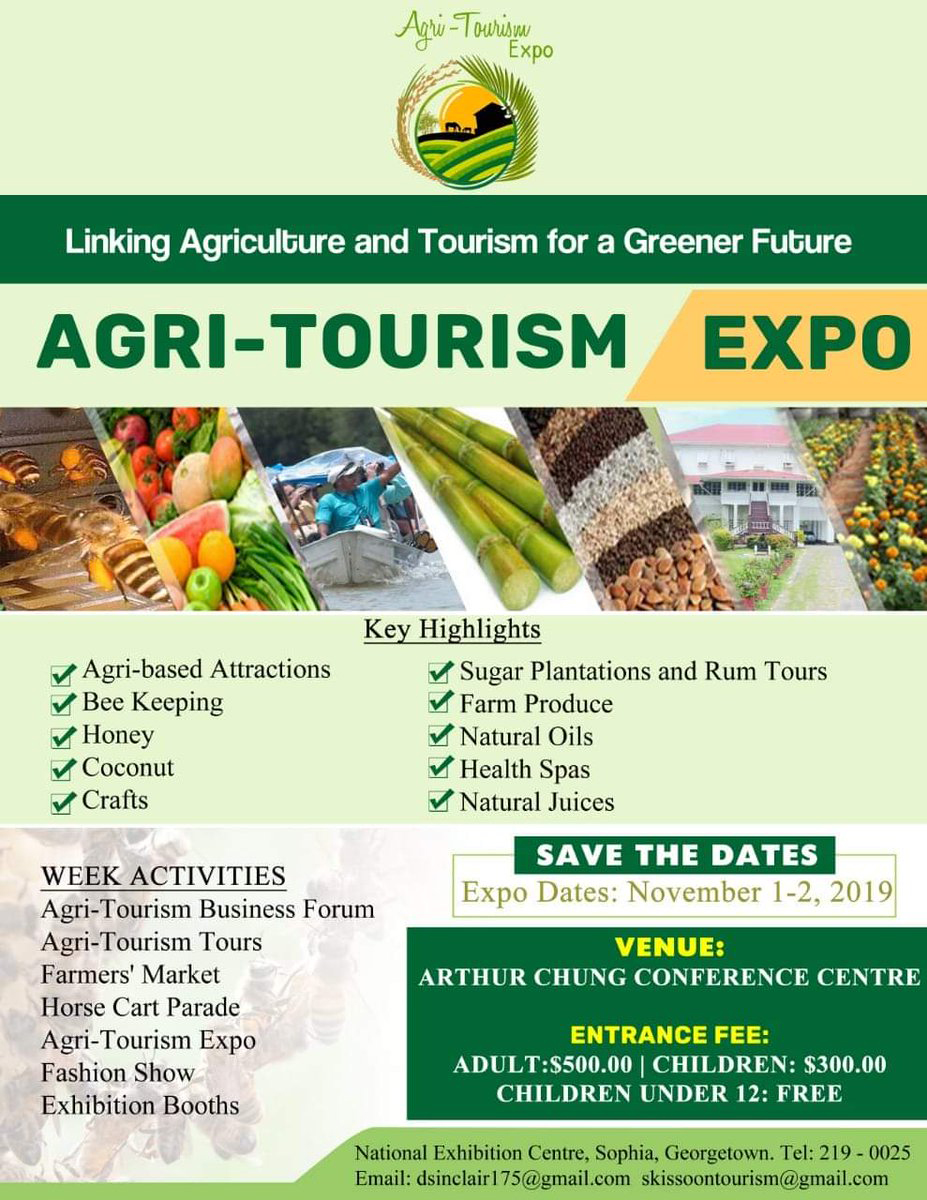Yesterday, the Department of Tourism, the Ministry of Business, the Guyana Tourism Authority and the Tourism and Hospitality Association of Guyana launch-ed Guyana’s first ever Agro-Tourism Expo which will be staged up to November 2, 2019. According to the organizers the event will make recommendations relating to a range of agriculture and tourism-related developmental issues.
Given the contribution that agriculture has made to livelihoods and to the economy over the years, we in Guyana have every right to find ways of celebrating our agricultural sector and linking with tourism is certainly one of those.
Agro-tourism is essentially tourism for recreation that involves active use of the farm and is implemented in various forms including rental of premises with the on-farm services that allow the visitor a pleasing agrarian experience.
Agro-tourism continues to increase its visibility across the world even though it still has not reached the point of being a major money-earner for most countries.
Agro-tourism faces a number of challenges seeking to attract visitors on an all-year-round basis in order to broaden the base of small rural enterprise and ensure the permanent employment of the rural population. To this can be added the maintenance of local attractions in proper conditions, raising the cultural level of the population, supporting local folk crafts, preserving traditions, nature monuments, etc. Here agro-tourism has something in common with ecological or green tourism.
Globally, agro-tourism has become a form of niche tourism considered a growth industry in many parts of the world. India, Australia, Canada and the USA are considered countries with strong agro-tourism sectors.
Agro-tourism can also be seen as the meeting point between agriculture and tourism, that provides participants therein with a range of educational experiences, beginning with simple farm tours and extending to farm-related celebrations including festivals. It is a season during which farmers turn their farms into what the tourist industry commonly calls ‘destination,’ and open their doors to visitors in order to impart knowledge and experiences regarding what they do.
Globally, agro-tourism has become an increasingly popular industry, its uniqueness offering tourists the privilege of planting seeds and picking and eating their own fresh fruit and roping cattle.
In essence, the agro-tourism experience helps tourists to understand and appreciate the land and the people who live on it.
It is no secret the contemporary international tourism travel has extended beyond just ticking through the mandatory list of local museums and sites. Tourists often want to slow down when they discover a new destination. They want to meet locals in their natural environments and become more involved with the land they are visiting. It is against this backdrop that agro- tourism evolved. Indeed, at its most basic level, agro-tourism is a style of travel that takes place on a farm or ranch and usually offers the opportunity to help with on-site farming or ranching tasks during the visit. It entails a meaningful visit with a producer of land-based products and services.
It is, however, not all about staying in a village and relishing the food, It provides an opportunity to ‘ground’ with people whom you are unlikely to meet within the environs of your five-star urban comfort. One of the best things about staying on a farm is that guests can contribute to the place through their involvement. The idea is to make tourists live life like a villager, right from milking the cow, ploughing the field, bathing in a well to climbing a tree and plucking fruits.
Lifestyle considerations often arise in discourses about agro-tourism. It is no secret that the world of today’s urban children has shrunk through closed-door schools, classes, television, computers and video games and the internet, to name a few. Agro-tourism continues to expose urban children to different, often life-changing experiences.
As commercialization becomes the standard by which we live, agro-tourism has given farmers and other people employed in the sector opportunity to share their work with the masses. Some agro-tourism experiences allow guests to buy food products grown on the farm or hand-crafted products made by the farmers’ families; purchasing these goods helps provide farmers who rely on their land with another source of income. This has certainly been the case here in Guyana, notably in the hinterland areas, where visitors to Guyana learn a great deal about their way of life by visiting Amerindian communities and experiencing their way of life.
In some countries, home and consumer education have long given way to technology–related existence so that many children grow up without ever really knowing what the countryside is or what it is like to interact with live farm animals. In this context, agro-tourism in Guyana should place particular emphasis on the rural/countryside experience that enables children to experience worthwhile options to city life.
Agro-Tourism Farms:
Agro-tourism farms offer tours that allow for viewing (and participating in) the growing, harvesting and processing of local foods. The farms also provide home-stay opportunities and general education on the workings of the farm. Children who visit the farms often have never seen live animals besides their pets This form of expanded agro-tourism has given birth to what are often called entertainment farms that not only offer regular farms products but also food, mazes, open-pen animals, train rides, picnic facilities and pick-your-own produce.
Agro-Tourism Benefits:
The potential benefits of agro-tourism development extend to farmers, rural communities and tourism operators.
For farmers agro-tourism is a potential way of expanding farm operations; using farm-based products in new and innovative ways; improving farm revenue streams, developing new consumer market niches, increasing awareness of local agricultural products; increasing appreciation of the importance of maintaining agricultural land and improving farm living conditions, working areas & farm recreation opportunities.
Here in Guyana agro-tourism can perform the dual function of raising awareness of the importance of the country’s agricultural sector while enhancing the profile of a tourism sector which is currently seeking to make a more significant mark globally.





